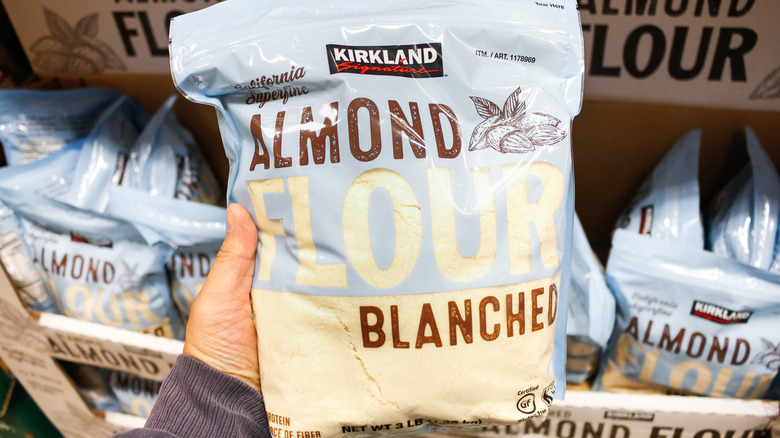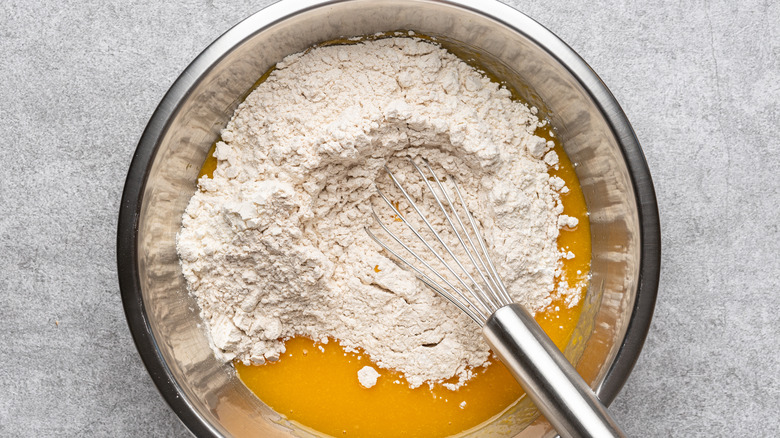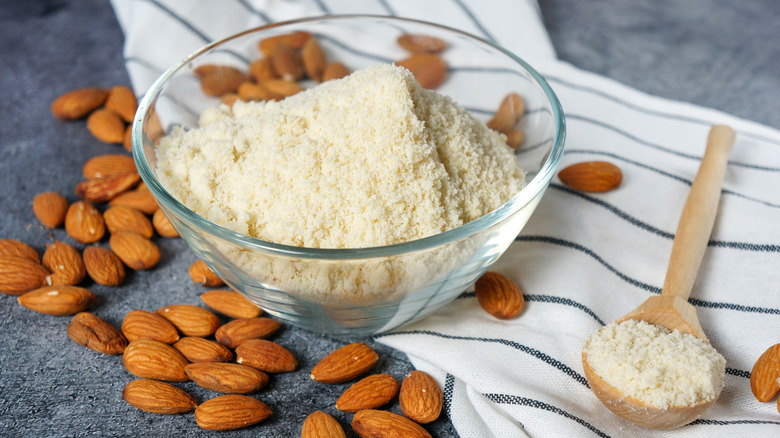The Bulk Costco Flour Baking Pros Keep In The Freezer
If you're getting serious about your baking habit, eventually, you're going to end up with various small bags of specialty flours stuffed into your cupboard. There's the rye from your sourdough days, chickpea from that time you made socca all week, 00 and semolina from a homemade pasta kick, glutinous rice for mochi, masa harina for tortillas, and a batch of tamales. And, after watching a whole season of "The Great British Bake Off," the almond flour for batch after batch of macarons. It doesn't make sense to bulk-buy every bag for every special project — but there's an exception for almond flour.
Pro bakers have their secrets for amping up recipes. And as pastry chef Keya Wingfield writes for The Kitchn, almond flour is a favorite for providing a lightness to "most any baked good." Once you learn all of the ways it can be used in your staple recipes, this ingredient is one worth buying in bulk from Costco (three pounds for $11.79 at Costco versus one pound for $8.99 or more at the supermarket) and stashing in the freezer.
Start adding almond flour to everything
In most baking recipes, the directions will often say "mix until just combined" or "fold in gently" or "be careful not to overmix." Wheat flours develop gluten when you work them. While this is great for bread, it's bad for your cakes and more delicate pastries; overworking the batter or dough will make them tough.
Almond flour, being ground nuts, has no gluten. And as it's a very fine consistency, it easily incorporates into recipes to provide a light structure. Pastry chef Keya Wingfield loves using it for muffins and pancakes to create an extra-fluffy result. You can swap some of the wheat flour out of recipes to introduce a new texture, or you can substitute all-purpose flour for almond flour to create gluten-free cake recipes. It's a no-brainer to swap out some of the all-purpose flour in an almond scone recipe for almond flour, and you should definitely make a batch of these almond sheet pan croissants next weekend.
Swapping out just a little flour won't invite a noticeable change to the taste. But the more you add to the recipe, the more it'll taste of almonds. King Arthur Baking Company recommends swapping out up to ⅓ of the flour in a yeasted dough but only ¼ of the flour in a non-yeasted dough for recipes that aren't written specifically for almond flour.
Storing bulk almond flour
Flour does, indeed, go bad. Quick, run to your cabinet; how long has your flour been there? If the flour is past its "best by" date, you're not alone.
White wheat flours last longer and can often be used past their best-by date. Because they're processed to take many of the oils out, there's less of what makes flour go bad. Nut flours, meanwhile, have a high oil content, which is the main thing that will turn them rancid. They also tend to have a higher moisture content, promoting mold growth. To determine if your nut flour is still good to use, give it a sniff and, if you're still not sure, a little taste. Almond flour should taste clean, a little nutty, and slightly sweet. If you're getting any sour notes or bitterness, do not use it.
To avoid catastrophe, store your almond flour in the freezer, tightly sealed. The dark, dry, cold environment will protect your three-pound bag of Costco almond flour from going bad before you get through all of it. (But if you're baking like the pros, you won't have to worry too much anyway.)


